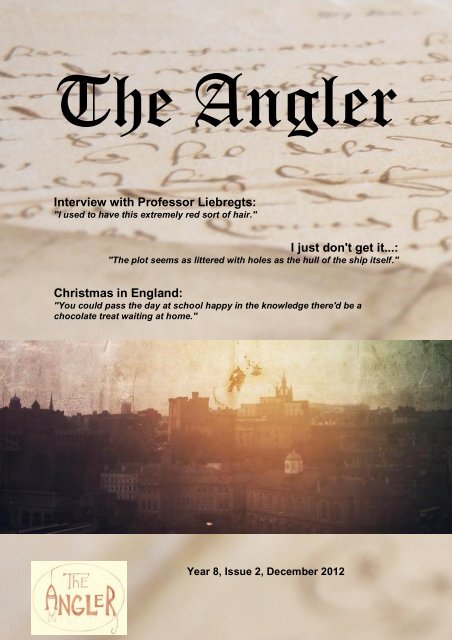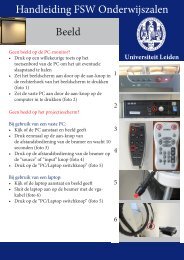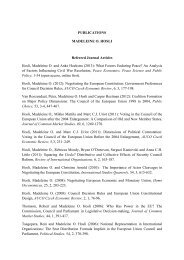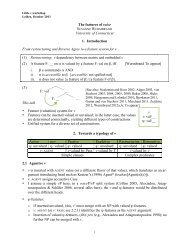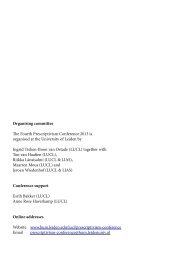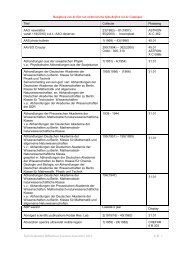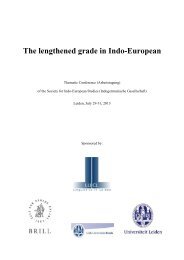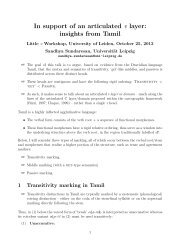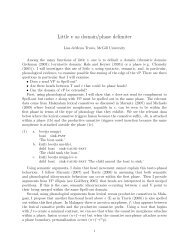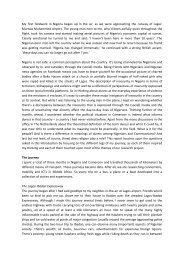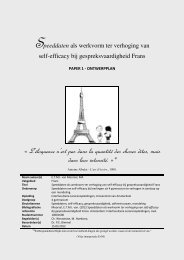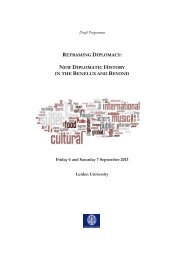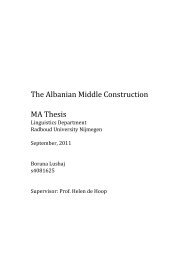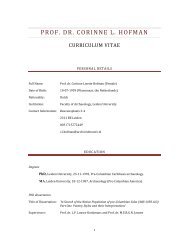Issue 2 - O
Issue 2 - O
Issue 2 - O
You also want an ePaper? Increase the reach of your titles
YUMPU automatically turns print PDFs into web optimized ePapers that Google loves.
The Angler<br />
Interview with Professor Liebregts:<br />
"I used to have this extremely red sort of hair."<br />
I just don't get it...:<br />
"The plot seems as littered with holes as the hull of the ship itself."<br />
Christmas in England:<br />
"You could pass the day at school happy in the knowledge there'd be a<br />
chocolate treat waiting at home."<br />
Year 8, <strong>Issue</strong> 2, December 2012
Editorial<br />
It’s Christmas time! Well, not yet, but it is soon<br />
approaching. At the moment we are all quite busy with studying<br />
for those pesky exams coming up, cramming in time to write<br />
those essays, while still trying to find time to not only finish the<br />
homework for this last week but also try and get some sleep. It<br />
seems like a nearly impossible task, I know. Keep in mind though<br />
that just 2 short weeks from now it is finally Christmas! As ‘tis the<br />
season, we decided to give you a Christmas themed issue of The<br />
Angler this time.<br />
Read up on what delicious treats you’d get to eat during<br />
a Christmas dinner in the middle ages, see what Harry Potter’s<br />
Christmases have been like, and do not forget to watch those<br />
classic Christmas movies we all know and love.<br />
We also have a great interview with our very own<br />
Professor Liebregts, be quick to find out what he was like as a<br />
student!<br />
I wish all of you good luck with the the upcoming exams<br />
and with writing all the essays. They will soon be over<br />
(thankfully!) and you all will be able to enjoy that well deserved<br />
break.<br />
Have a very merry Christmas and a wonderful New Year<br />
celebration.<br />
EDITION<br />
Year 8, <strong>Issue</strong> 2<br />
Colophon<br />
EDITOR<br />
James Lokas<br />
BOARD<br />
James Lokas<br />
Franziska Mattler<br />
Hanne Kouwenberg<br />
COMMITTEE<br />
Valerie Brentjes<br />
Maj Hansen<br />
Marten van der Meulen<br />
Anne Rutten<br />
FREELANCE WRITERS<br />
Emily Allinson<br />
Benny Baumann<br />
Eric Brotchie<br />
Ingrid van Busschbach<br />
Marten van der Meulen<br />
Anonymous<br />
INTERVIEWEE<br />
Peter Liebregts<br />
PHOTOGRAPHY & ARTS<br />
Maj Hansen<br />
Bas Foppen<br />
WITH MANY THANKS TO<br />
Karin Hendrikse<br />
All the best,<br />
James Lokas, Editor<br />
SPONSOR<br />
Wesoby B.V.<br />
Copyright<br />
The contents of The Angler (online and<br />
printed version) are copyright of The<br />
Angler. All rights reserved. Information of<br />
the web site and magazine, including but<br />
not limited to, text and images, may not,<br />
except for strictly private purposes or<br />
where otherwise indicated, be<br />
reproduced, transferred, distributed or<br />
stored without prior written permission by<br />
the board of The Angler. Modifications to<br />
the content of the web site and magazine<br />
are expressly prohibited.<br />
The Angler – Year 8 – <strong>Issue</strong> 2 1
Content Page<br />
Content<br />
Editorial 2<br />
Philology: “Of Crispels and Crusage Gentyle – Medieval Christmas Dinner.” 4<br />
Literature: “Nargles in the Mistletoe.” 6<br />
Linguistics: “Is English Threatening the Dutch Language?” 8<br />
Language Acquisition: “What Do You Mean ‘Jack Skellington hijacked Christmas again’<br />
‽” 10<br />
Interview: “Professor Liebregts: From Rebellious Student to Full Professor.” 12<br />
Culture: “Christmas in England.” 17<br />
All Things Albion!: “Drinks, Movies, Werewolves, and Goodbyes.” 19<br />
All Things LEF!: “From the Director.” 20<br />
Movie Review: “Nostalgic Noel.” 21<br />
Going Abroad: “Part II: Money.” 23<br />
International Students: “I just don’t get it...” 25<br />
Creative Writing 27<br />
The Angler – Year 8 – <strong>Issue</strong> 2 2
Philology<br />
Rutten<br />
Of Crispels and Crusade Gentyle – Medieval Christmas<br />
Dinner<br />
Christmas is fast approaching: a time of<br />
joy and festivities, but above all, eating.<br />
Whether you gorge yourself on mince<br />
pies, or sit through several three-coursedinners<br />
between Sinterklaas and New<br />
Years Eve, food is a central part of the<br />
celebrations. Nowadays, every kind of<br />
meat and every sort of vegetable is<br />
available throughout the year, and<br />
Christmas dinner is a lavish event<br />
comprised of the tastiest of morsels.<br />
However, this decadence is not a far cry<br />
from medieval eating habits. Poor<br />
peasants would be lucky to eat twice a<br />
day, but the English nobility feasted on<br />
luxurious items every day! So what can<br />
you expect, should you be invited to a<br />
dinner at the Percy’s?<br />
After your arrival, you will be shown to the<br />
great hall. Your place at the dinner table is<br />
determined by your rank: grooms, valets<br />
and other servants sit on the far end of the<br />
hall, but as a valued highborn friend, you<br />
will join the lord’s table. Napkins have not<br />
been invited yet, but you will be expected<br />
to wash your hands – do not fret, there are<br />
servants to pour the water and hand you<br />
towels. As you sit down, another servant<br />
will pour you wine. These alcoholic<br />
beverages will have been imported from<br />
France, the Low Countries, or even Spain.<br />
Again, the quality of the wine depends on<br />
your rank and pedigree. Before the dishes<br />
are brought in, grace is said by the<br />
chaplain – after all, you are in a proper<br />
Christian household! The Church imposes<br />
itself on dinner through other means as<br />
well. Christians are supposed to observe<br />
the fast days, so on Wednesdays, Fridays<br />
and Saturdays, no meat is allowed at the<br />
table. In addition, the periods of Lent and<br />
Advent are traditionally fast days, meaning<br />
that for half the year, you will eat<br />
vegetarian.<br />
When the dishes are brought out, you will<br />
have to wait just a little bit longer. The lord<br />
is entitled to the first choice, and once he<br />
has sampled his favourite dishes,<br />
they are passed around.<br />
You might find Mortreus de Chare on your<br />
plate, a meat dish thickened with eggs and<br />
bread, or Leche Lombard, a sort of<br />
medieval haggis. A real treat is the Poume<br />
d’Oranges, which is a variety of meatballs<br />
made to resemble oranges. Most of these<br />
dishes are boiled or baked meat, served<br />
with sauces or jelly, and pottages or stews<br />
dominate this course. On fast days, you<br />
will be served with equally tasty dishes.<br />
The eel pie, poached mulwell or baked<br />
lampreys are just as delicious, and the<br />
spicy galantine sauce tops it off nicely.<br />
Although you might be rather hungry, you<br />
should resist the temptation to wolf<br />
everything down. There are two more<br />
courses coming up, and you will be stuck<br />
at dinner for two more hours.<br />
After the table has been cleared, some<br />
fruits and nuts are brought in: this heralds<br />
the intervening course. These are small<br />
snacks, and sometimes, they are not even<br />
meant to be eaten. This short pause might<br />
include a marvel, such as birds flying out<br />
of a pie. When you discuss the marvellous<br />
surprise with one of the many Henrys<br />
present, the second course is brought out.<br />
These roasted animals are dressed to<br />
impress: the heron is dismembered, the<br />
coney is unlaced. There will be pottages,<br />
stews and pies as in this course as well,<br />
but the focus lies on the many exotic<br />
animals. In the Middle Ages, you would<br />
usually eat pork or beef, in a nobleman’s<br />
household, you could expect to eat<br />
peacock, woodcock or lark too! Needless<br />
to say, these were costly meats, and<br />
served to show off the earl of<br />
Northumberland’s riches and good taste.<br />
Fish was no exception: salmon, trout and<br />
turbot are on the fast day menu, and they<br />
are dressed as exquisitely as the meat.<br />
The nobility can afford to buy the<br />
expensive fresh fish, and they have no<br />
problem presenting their wealth.<br />
The Angler – Year 8 – <strong>Issue</strong> 2 3
Philology<br />
Rutten<br />
Dessert is comprised of many delicious<br />
treats. While you might find sparrows and<br />
beavers (a fish under Church ruling),<br />
another sign of the lord’s wealth, you can<br />
also find familiar dishes such as apples,<br />
strawberries and pears. These were<br />
spiced, baked or otherwise preserved to<br />
last for a long time: fresh fruits were<br />
believed to be bad for your health. Often<br />
the fruit is made into a pie or pudding, as<br />
proven by the the popular Chireseye<br />
(cherry pudding) and Fruays (apple<br />
pudding). Of course, dessert depended<br />
heavily on the season: in winter, you will<br />
not eat cherries or grapes. During a last<br />
drink with Henry, the servants carry out<br />
the leftovers. They will not be thrown<br />
away: beggars at the gate receive the<br />
broken meats gladly. Tonight, in the true<br />
Christmas spirit, everyone goes home with<br />
a full belly.<br />
Anne Rutten<br />
Interested in daily life in medieval England? The Time Traveller’s Guide to Medieval England by Ian<br />
Mortimer makes for an amusing read, and it is historically correct too!<br />
Want to make your own medieval dinner? http://www.godecookery.com/ has a ton of medieval recipes<br />
from all over Europe!<br />
The Angler – Year 8 – <strong>Issue</strong> 2 4
Literature<br />
Hansen<br />
Is the fake tree dusted? Are the presents<br />
wrapped already? Have you thought of a<br />
way to escape annoying family members<br />
at the party? You are probably not the only<br />
one wishing for real snow, a real tree, and<br />
in particular: an exciting way of celebrating<br />
Christmas where unexpected events will<br />
enchant you...Well, grab your broomstick<br />
and travel to a remote place in the<br />
mountains of Scotland. Cross the Loch,<br />
evade the Whomping Willow and carefully<br />
skid down your broom into the huge piles<br />
of fluffy snow covering the grounds of our<br />
favourite castle: Hogwarts School of<br />
Witchcraft and Wizardry. What place is<br />
better to enjoy a Christmas dinner than the<br />
Great Hall, decorated with the twelve<br />
(authentic) frost-covered trees, enchanted<br />
snow and glittering icicles? Perhaps you<br />
even get the chance to pop one of<br />
Cribbages’ Wizarding Crackers and hear<br />
some of Peeves the Poltergeist’s ‘adapted’<br />
versions of the traditional carols.<br />
Of course, Christmas is a special time<br />
anywhere around the world, but Harry<br />
Potter in particular experiences marvellous<br />
days in this period of the year. The<br />
grounds of Hogwarts are lit by fluttering<br />
fairies, portraits are getting tipsy of too<br />
much liquor, and eager house elves<br />
prepare a myriad of dishes and puddings.<br />
It is probably the only place where<br />
mistletoe is a threat, as it might be<br />
inhabited by Nargles – if you are willing to<br />
trust Luna Lovegood. Hogwarts’<br />
Christmases are not only unique because<br />
of the decorations and feasts however.<br />
Without the presents and opportunities<br />
Christmas provides, Harry would never<br />
have been able to go through all of his<br />
adventures. The Dursleys might send him<br />
‘generous’ gifts such as a toothpick, but<br />
what would he be without the Marauders’<br />
Map, or his Invisibility Cloak? Let’s have a<br />
look at the aspects of the consecutive<br />
Christmases of the ‘boy-who-lived’.<br />
His first year at Hogwarts is also the very<br />
first time that Harry receives Christmas<br />
presents. His pile of packages contains a<br />
Weasley Jumper – hand knitted of course<br />
– Chocolate Frogs, and the Cloak of<br />
Invisibility. This special garment is the<br />
beginning of Harry’s roaming the corridors<br />
at night and discovering secrets such as<br />
the Mirror of Erised (desire spelt<br />
backwards). In fact, the Cloak will prove<br />
of great value throughout his adventures in<br />
all of the books. Another significant<br />
present is the early Christmas gift of the<br />
Weasley twins in his third year: the<br />
Marauders’ Map. This map enables Harry<br />
to visit Hogsmeade, the nearby village<br />
where all kinds of shops dealing in magical<br />
merchandise are located. While<br />
eavesdropping on some teachers in the<br />
Three Broomsticks, Harry discovers how<br />
his parents were betrayed by their best<br />
friend, which sets quite an important part<br />
of the plot in motion.<br />
Indeed, for Harry and his friends<br />
Christmas is not a quiet period at all. In<br />
many of the books an opportunity for<br />
something, or important turn in the story,<br />
seems to be created by the festive<br />
circumstances. The Polyjuice Potion, for<br />
instance, is drunk at Christmas day by the<br />
companions to try to discover more about<br />
the heir of Slytherin. No comfortable<br />
digesting for the friends after tea, but<br />
straight unto solving another mystery.<br />
Or the Yule ball; Harry’s fourth year at<br />
Hogwarts proves to be an unconventional<br />
one, as everything is accommodated for<br />
the Triwizard Tournament. Naturally, with<br />
two sister schools (Durmstrang and<br />
Beauxbatons) on the grounds, a traditional<br />
Christmas is not enough. When Harry and<br />
Ron are tired of dancing, they discover<br />
quite some secrets: the discussion of<br />
Snape and Karkaroff about death-eaters<br />
business, Hagrid confessing to be a halfgiant<br />
in the gardens, and a way of dealing<br />
with the enigma of the golden egg.<br />
The Angler – Year 8 – <strong>Issue</strong> 2 5
Literature<br />
Hansen<br />
From Hogwarts in the first four books the<br />
setting of Christmas shifts to other places<br />
in the following parts. First of all, in book<br />
five Harry visits the headquarters of the<br />
Order of the Phoenix. However, the<br />
gloomy atmosphere of Grimmauld Place<br />
does not prevent him from having a merry<br />
time altogether. After surviving a kiss with<br />
Cho Chang in the Room of Requirement, a<br />
vision of Voldemort’s snake attacking<br />
Ron’s dad and the subsequent idea of<br />
being possessed by his enemy, Harry can<br />
finally be cheered up by Sirius’s songs. He<br />
does not know that lessons of Occlumency<br />
await him after this.<br />
Secondly, in Harry’s sixth year Christmas<br />
is spread over different places: Hogwarts<br />
and the Burrow, the cosy house of the<br />
Weasleys. With Lord Voldemort officially<br />
returned, Harry is trying to figure out what<br />
role Draco Malfoy plays in his plans.<br />
Professor Slughorn’s Christmas Party<br />
unexpectedly provides an opportunity for<br />
this: when following Snape and Malfoy,<br />
Harry’s suspicions of both Slytherins<br />
increase. A more comforting thought is his<br />
stay at the Burrow with his friends in yet<br />
another Christmassy atmosphere.<br />
Especially the memorable sight of the<br />
garden gnome, painted gold and dressed<br />
up in a tutu to represent an angel, is only<br />
possible at the Weasleys’.<br />
Unfortunately, Harry neither spends<br />
Christmas Eve in a decorated castle nor at<br />
his second most favourite place in the<br />
world in the last book, but in the extremely<br />
cheerful ambiance of a graveyard. In their<br />
search after Horcruxes Harry and<br />
Hermione (as you probably remember Ron<br />
left them after a row) resort to visit<br />
Godric’s Hollow, the place where Harry’s<br />
parents lived before they were murdered.<br />
They hope to find Gryffindor’s sword with<br />
Bathilda Bagshot, the author of A History<br />
of Magic. It proves to be a more<br />
disastrous Christmas than ever, as Harry<br />
finds himself in a precarious trap; Bagshot<br />
is possessed by the snake of Voldemort.<br />
Both he and Hermione escape in the nick<br />
of time, at the cost of Harry’s wand.<br />
Luckily, a few days later Ron returns: he<br />
rescues Harry from drowning in an icecold<br />
pond in the forest of Dean. A late<br />
Christmas present is the discovery of<br />
Gryffindor’s sword in the same pond. In<br />
any case, there is an abundance of snow.<br />
Indeed, Hogwarts does provide the<br />
ultimate atmosphere for a marvellous and<br />
charming Christmas party. The<br />
decorations, the feast, the white snow<br />
instead of the watery black slush generally<br />
seen around here; that is an admirable<br />
example. So, if you want a Christmas<br />
worthy of Hogwarts, dress your little<br />
brother or sister up as a house elf, drag<br />
along some snow cannons and confiscate<br />
a heap of Weasley’s Wizard Wheezes. But<br />
do not expect a relaxed party, because a<br />
combination of Harry Potter and Christmas<br />
often seems to end up in drinking<br />
disgusting potions, having terrifying<br />
nightmares, removing Christmas baubles<br />
in the shape of your own head or even<br />
fighting a deathly snake. Maybe a<br />
traditional, yet boring feast with your family<br />
under a fake tree is not that bad after all...<br />
Merry Christmas!<br />
Maj Hansen<br />
The Angler – Year 8 – <strong>Issue</strong> 2 6
Linguistics<br />
v.d. Meulen<br />
Is English threatening the Dutch language?<br />
Recently I have come into contact with a<br />
group of people called “Stichting<br />
Nederlands”. This is a group that actively<br />
resists the increasing number of English<br />
loanwords in the Dutch language. This<br />
organization was created in 1998 by<br />
people who were aware of the “English<br />
craze” (from their website), and tries to<br />
both dam in the amount of new English<br />
loanwords and come up with “good” Dutch<br />
alternatives. They are not alone in their<br />
opinion: OnzeTaal, a popular magazine<br />
about language, has a whole file on the<br />
anglification of Dutch. They feel that if<br />
something is not done, Dutch will be the<br />
second language in the Netherlands by<br />
2060, after English. But is this fear<br />
justified? Will Dutch disappear in fifty<br />
years?<br />
There is something to say for<br />
people who fear that Dutch will disappear:<br />
the number of languages in the world is<br />
declining rapidly. An often-heard estimate<br />
is that of the 6,000 languages used today,<br />
90% will be lost within the next 100 years.<br />
However, it is (at this point) very and<br />
extremely unlikely that Dutch will be a part<br />
of these dying languages. The reasons for<br />
this are manifold. Dying languages usually<br />
have declining numbers of speakers, but<br />
Dutch speakers are only increasing in<br />
number. Nowadays there are more than<br />
ever with more than 23 million speakers. A<br />
language is severely threatened when it is<br />
not the official language of a nation, or<br />
when children aren’t taught in the tongue<br />
anymore, or when another language takes<br />
over the original language. None of these<br />
factors apply to Dutch. But there is of<br />
course language contact, and new words<br />
do appear.<br />
New words are created all the time:<br />
they can for example be made from<br />
existing words by derivation (an NCIS-like<br />
show) or compounding (a<br />
mothergoosefucker), or they can come<br />
from other languages. This last<br />
phenomenon is called borrowing, or<br />
loaning words. It is certainly true that in the<br />
last decades we have borrowed quite<br />
extensively from English. Before that,<br />
there were periods when Dutch borrowed<br />
heavily from French and German. In fact,<br />
of the total number of loanwords in Dutch,<br />
the majority is still from French and Latin.<br />
Even words like kaas ultimately derive<br />
from Latin. Latin used to have a lot of<br />
influence in Roman times and in the<br />
Middle Ages. Later, the Dutch borrowed a<br />
lot of words from French, especially in the<br />
16 th to 19 th century when French culture<br />
was dominant in Europe. Lastly, German<br />
was influential as a language, supplying<br />
many words that we today would hardly<br />
recognize as being German (such as the<br />
word leenwoord, meaning loanword)<br />
English words have only really started to<br />
appear in Dutch after the Napoleonic wars,<br />
when French influenced waned.<br />
Two other things are very<br />
important to realize about the distribution<br />
and life of loanwords. Opponents of<br />
English in Dutch often say that there are<br />
many thousands of English words seeping<br />
into every part of Dutch. That is not strictly<br />
speaking true: a lot of the English words<br />
are restricted to very specific fields, such<br />
as business management. Your Average<br />
Joe won’t use any of these words.<br />
Furthermore, it is vital to understand the<br />
notion of fashion words. As I said earlier,<br />
Dutch has loaned words from many other<br />
languages in the past, but these words<br />
also disappear again. A good example of<br />
transitoriness of loanwords comes from a<br />
Dutch book I recently read, called<br />
Eenzaam Avontuur. This book was written<br />
in 1948 and has an inordinate amount of<br />
French words in it, words that must have<br />
been quite readily understood at the time.<br />
Reading this book now it strikes me as<br />
distinctly odd and old-fashioned to read<br />
words such as désavoueren (see how the<br />
word is bastardised with the Dutch verb<br />
marking suffix –en), or an embarras de<br />
choix (an expression which I didn’t even<br />
readily understand). These expressions<br />
have (as far as I’m aware) disappeared<br />
from our language use.<br />
Finally, evidence has seldom been<br />
found that borrowing would hasten<br />
language death. Language death often<br />
goes through various stages, but there<br />
must always be a replacement language.<br />
The Angler – Year 8 – <strong>Issue</strong> 2 7
Linguistics<br />
v.d. Meulen<br />
In other words, language death is almost<br />
always preceded by bilingualism. There is<br />
a type of language death called sudden<br />
death, where the last speaker of a<br />
language dies without there being a<br />
bilingual period, but this is very rare. An<br />
example of this is Tasmanian.<br />
So loanwords, no matter how many<br />
there may be, are not a threat to Dutch.<br />
This is unfortunately not the whole picture<br />
of the language contact between Dutch<br />
and English. The fact cannot be denied<br />
that the global use of English is spreading<br />
rapidly. Besides there being more than<br />
300 million L1 speakers of English, the<br />
number of L2 speakers is enormous, with<br />
estimates varying from 500 million to 2<br />
billion. Many of these L2 speakers are just<br />
like us: we use our mother tongue for the<br />
largest part of our daily lives and only use<br />
English in restricted domains. One of<br />
these domains is higher education. This is<br />
unsurprising when one studies English<br />
Language and Culture, but it is not only<br />
our own study where English is very<br />
common: most of the masters are in<br />
English, many bachelors, such as<br />
Linguistics, are partly taught in English,<br />
and a great number (maybe a majority) of<br />
studies, including Medicine, draw heavily<br />
upon English literature. This is the real<br />
threat to Dutch, and it is right here in our<br />
own university.<br />
Why is the use of English as the<br />
primary language in higher education<br />
dangerous? This question can be<br />
answered on several levels. For the<br />
purpose of this article it is most relevant<br />
that the increasing use of English can lead<br />
to domain loss. It is not unthinkable that at<br />
some point all higher education will be<br />
taught in English. The advantages are<br />
clear: books do not have to translated,<br />
worldwide communication between<br />
students, professors and staff will be<br />
greatly facilitated, and it will be easier for<br />
our students to study and teach abroad.<br />
But the dangers are that we lose part of<br />
identity and part of our creativity: of the<br />
more than 19,000 students at Leiden<br />
University, how many are able to<br />
communicate in English at the same level<br />
as they do in their mother tongue? And<br />
when all higher education is taught in<br />
English, then it might be beneficial for<br />
students to gain more knowledge of<br />
English in high school. And to prepare<br />
them for that, it might become necessary<br />
to teach more English in elementary<br />
school! And then eventually Dutch will<br />
become the primary language of<br />
education, and finally of our country. This<br />
may seem as a reductio ad absurdum, but<br />
this is a lot more likely to happen than the<br />
death of Dutch because of loanwords.<br />
Education is a vital register for the<br />
continued survival of a language.<br />
The problem of course is: what can<br />
we do about it? Any solution has so many<br />
disadvantages that it becomes impossible<br />
to employ. The “Stichting Nederlands” is<br />
strongly opposed to using English words<br />
where perfectly good Dutch words are<br />
available. This of course is impossible to<br />
enforce: speakers (and writers to a lesser<br />
extent) will damn well use whatever word<br />
they like! But the use of English in<br />
education can be controlled. One of the<br />
actions that have to be undertaken is the<br />
translation of scientific books in Dutch. A<br />
costly solution, yes, but one that will<br />
ensure the lasting possibility of being able<br />
to teach in Dutch, not in English. All<br />
arguments about internationalization are of<br />
course plausible, and if all bachelors are<br />
taught in Dutch than at some point more<br />
English education has to be introduced.<br />
This is an ongoing problem. But let<br />
me just repeat here: Dutch is not under<br />
threat. Loanwords have been around<br />
forever, and will continue to be used.<br />
Whether or not to use English loanwords<br />
is mostly a question of aesthetics, and<br />
people should decide for themselves what<br />
they think is beautiful and what is not,<br />
because in the end, de gustibus non est<br />
disputandem. It would help though if<br />
people would just let other people be, and<br />
stop nagging about all kinds of “wrong”.<br />
Remember folks: there is no right and<br />
wrong in language: there is only usage.<br />
Marten van der Meulen<br />
The Angler – Year 8 – <strong>Issue</strong> 2 8
Language Acquisition<br />
Brentjes<br />
What do you mean “Jack Skellington hijacked<br />
Christmas again”‽<br />
Punctuation is, with a grain of salt, the<br />
greatest invention since the number<br />
zero. It allows for near-limitless<br />
possibilities to express oneself, so<br />
mastering it is essential. Poor Romans<br />
who never had either. However, “nearlimitless”,<br />
in my opinion, is not quite<br />
good enough. Sometimes the<br />
extensive rule set bogs one down, and<br />
sometimes the right symbols seem to<br />
be missing, especially because written<br />
text does not carry some emotions as<br />
well as spoken text.<br />
When taking another good look at the<br />
title of this article, you will find my first<br />
complaint about English punctuation.<br />
In fiction, one can easily write “Did the<br />
Christmas lights explode?” I<br />
exclaimed. Although in essays one<br />
may not want to yell at your readers,<br />
consider blogging. Capitalising a<br />
statement will, as is common on the<br />
Web, be considered childish unless<br />
the culprit is J.K. Rowling. Sure, you<br />
could italicise or write in bold<br />
typeface, but perhaps your font looks<br />
pretty in neither or you want to draw<br />
yet more attention to Did she really<br />
say “All I want for Christmas isn’t<br />
you”?<br />
This is where the interrobang, a<br />
combination of the question mark and<br />
the exclamation point (also known as<br />
the “bang”), comes in. Martin K.<br />
Speckter, head of an advertising firm,<br />
introduced the symbol in 1962 to<br />
replace the awkward and unappealing<br />
“?!” or “!?” (interrobang-mks.com).<br />
Though the symbol enjoyed<br />
considerable popularity in the sixties—<br />
in the form of name and design<br />
suggestions, articles, and the inclusion<br />
of the interrobang in certain<br />
typefaces—it never caught on. Partly<br />
because it was considered<br />
unnecessary by some, partly because<br />
of limitations to the number of keys on<br />
typewriters, and partly because it was<br />
simply too expensive to<br />
incorporate an additional and<br />
most of all unconventional glyph<br />
(shadycharacters.co.uk). Although the<br />
majority of contemporary typefaces do<br />
not support the interrobang, as a<br />
vehement adversary of “?!” and its<br />
switched-up version (which one should<br />
I use anyway?), I think the interrobang<br />
would make a useful addition to<br />
English punctuation.<br />
Even more so, with an increasing<br />
amount of communication happening<br />
through computers and text<br />
messaging (or What’s Apping for all<br />
you modern kids with your<br />
smartphones and tablets) rather than<br />
speech, a demand has arisen for<br />
symbols to indicate tone in written text.<br />
People who miss ironic remarks and<br />
take them literally can be frustrating<br />
enough in conversation, but deadpan<br />
snarkers may run into a great deal<br />
more trouble on the Internet, where<br />
you cannot make a single ironic<br />
comment without offending half of the<br />
connected world.<br />
But it is not just modern society that<br />
could do with an irony marker: the first<br />
demand dates three centuries back to<br />
John Wilkins, who suggested an<br />
upside-down exclamation point (“¡”).<br />
Shady Characters’ webmaster Keith<br />
Houston writes:<br />
“Wilkins’ choice of the ‘¡’ seems<br />
most appropriate. The<br />
exclamation mark already<br />
modifies the tone of a<br />
statement, and inverting it to<br />
yield an ‘i’-like character both<br />
hints at the implied irony and<br />
suggests the inversion of its<br />
meaning.”<br />
In Ethiopian punctuation, the upsidedown<br />
exclamation point, known as<br />
Temherte Slaq, already exists to<br />
identify sarcastic or unreal comments<br />
(“A Roadmap to the Extension of the<br />
The Angler – Year 8 – <strong>Issue</strong> 2 9
Language Acquisition<br />
Brentjes<br />
Ethiopic Writing System Standard<br />
Under Unicode and ISO-10646”).<br />
However, this irony mark and many of<br />
its successors, such as the pointe<br />
d’ironie resembling a flipped question<br />
mark, failed to make it into the English<br />
punctuation set. Regrettably, if you ask<br />
me—because I would much rather use<br />
such a symbol than add tags<br />
around my text.<br />
Of course, irony works best when the<br />
speaker or writer does not call<br />
attention to the fact that he or she is<br />
being ironic, which I think is a strong<br />
argument against the use of a pointe<br />
d’ironie or other equivalents.<br />
Nevertheless, a way to indicate irony<br />
would clear up many a<br />
misunderstanding on the Web, so in<br />
certain contexts it would be<br />
appropriate.<br />
As a typography lover, I vote in favour<br />
of resurrecting the interrobang and a<br />
less artificial irony mark than a winking<br />
smiley or a pseudo-HTML tag. If not<br />
for any of the reasons stated above<br />
then because “‽” is much more<br />
aesthetically pleasing than “?!” or “!?”<br />
and because I have not been able to<br />
incorporate any ironic remarks in this<br />
article.<br />
Valerie Brentjes<br />
Wesoby B.V. Zaagstraat15, 7556 MX, Hengelo. T. 074 711 47 74 F. 074<br />
711 45<br />
E. info@wesoby.nl<br />
The Angler – Year 8 – <strong>Issue</strong> 2 10
Interview<br />
Busschbach<br />
Interview with Professor Liebregts: From Rebellious<br />
Student to Full Professor.<br />
Background Information:<br />
1986 Graduated in Classical Languages and Literatures in<br />
Utrecht<br />
1986-88 Teacher of Latin and Greek at two secondary<br />
schools in Arnhem.<br />
1987-88 Lecturer in the Department of Literary Studies at<br />
Utrecht University.<br />
1988 Research assistant with a research grant from NWO<br />
(Netherlands Organisation for Scientific Research)<br />
1993 PhD at Leiden University (Cum Laude)<br />
1993-1998 NWO post-doc researcher<br />
1999 Junior lecturer at the English Department of Leiden<br />
Back then: 21 years old.<br />
2004 Senior lecturer<br />
2006- Full Professor of Modern Literatures in English.<br />
(Courses he teaches in 2012: first-year course “The<br />
Classical and Christian Legacies”; third-year course<br />
“Anglo-American Modernism”; MA-course “James Joyce”;<br />
MA-course “Odysseys of Homer: Appropriations of the Iliad<br />
and Odyssey in 21 st -century English Culture”; MA-course<br />
“Art and Literature in Anglo-American Modernism”)<br />
2008-09 co-leader of the international research Theme<br />
Group “The (Post)Modern Augustine” at NIAS<br />
(Wassenaar).<br />
Now: 53, but at times still feeling 33 years old<br />
(when forced to reveal his emotional age).<br />
‘People do not believe me when I<br />
say: ‘I used to have this extremely<br />
red sort of hair.’’- Professor<br />
Liebregts.<br />
Monday afternoon 14:00 o’clock on a<br />
rather cold and cloudy day in Leiden. I<br />
am off to my appointment with<br />
Professor Peter Liebregts. Even<br />
though I took his<br />
class on Modern Literature a few years<br />
ago I did not really know what to<br />
expect from my interview with him.<br />
As a student you only get to know the<br />
teacher, but not so much the person.<br />
Therefore, finding out who Professor<br />
Liebregts the person is was my set<br />
goal for the day.<br />
Standing in front of Professor<br />
Liebregts’ office door, armed with a<br />
memorized resume that I googled from<br />
the net and a sheet of 30 questions in<br />
case all would go silent, I knocked on<br />
his door. There, I was greeted with an<br />
enthusiastic smile, which made me<br />
feel confident that I would be able to<br />
get a peek into the student years of<br />
this professor, who is otherwise<br />
always rather private about his<br />
personal life.<br />
The Angler – Year 8 – <strong>Issue</strong> 2 11
Interview<br />
Busschbach<br />
After getting tea and taking a seat on<br />
his sofa in his office I started to ask my<br />
questions. After the first, it immediately<br />
became clear that English Literature is<br />
not his only academic ‘love’, but that<br />
that developed alongside his love of<br />
Classical Languages and Literatures<br />
which he studied in Utrecht. Originally<br />
from the South and fresh from<br />
secondary school his choice to go and<br />
study in Utrecht in the late ‘70s was<br />
quite obvious for him. Simply, because<br />
he wanted to do something different,<br />
and not go and study in Nijmegen or<br />
Maastricht, where most of his<br />
classmates decided to go.<br />
When I asked: ‘Where did you live<br />
during your student years in Utrecht?’<br />
he made himself comfortable in his<br />
desk chair and started reminiscing<br />
fondly about his days as a student<br />
which started as he explains in his<br />
own words in Bilthoven, which is near<br />
Utrecht in an ‘very, very, very tiny<br />
(attic) room which was about 2.5 by<br />
2.5 m. It also had a slant roof! But, the<br />
first year I spent every weekend back<br />
home; because most of my friends<br />
actually stayed there and then slowly I<br />
got more involved in Utrecht’s social<br />
life. After the 3rd year I moved to<br />
Utrecht city itself and I shared a whole<br />
floor with a (rather rich) fellow student<br />
of mine’. An interesting detail that<br />
Professor Liebregts tells me slightly<br />
later is that even though he did not<br />
have to pay for it, the room that he<br />
shared came with its own<br />
housekeeper! So apart from now<br />
being able to stand up straight in his<br />
new room and even probably being<br />
able to run a marathon from one side<br />
to the other, he also did not have to<br />
worry about breadcrumbs on the floor<br />
or a sticky stove in the kitchen. I have<br />
to admit not bad if you are still a<br />
student.<br />
Nonetheless, before rooms were<br />
getting bigger and graduation was in<br />
sight Professor Liebregts worked all<br />
kinds of part time jobs. In his first<br />
academic year (’79) (before studying<br />
Classical Languages & Literatures) he<br />
took a job as a gardener of a dental<br />
practice which most of all meant<br />
raking leaves. Soon after he took an<br />
administrative job at a transport<br />
company called Van Gent and Loos.<br />
This first academic year was more a<br />
sabbatical year where he dropped out<br />
of university, but got acquainted with<br />
James Joyce’s Ulysses and worked<br />
long hours in order to save money to<br />
go to Dublin to make sense of the text<br />
that, in his words, he had ‘wrestled<br />
with’, ‘for weeks on end!’. This text<br />
would later prove to be one of his most<br />
favourite texts and most influential<br />
texts on his road to becoming a<br />
professor of English Literature.<br />
Then I asked: ’How would other<br />
people have described you as a<br />
student back then?’ He did not have to<br />
think for a second and gave me a<br />
surprising answer: ‘Rebellious!’ He<br />
explains to me that when he was a<br />
student in the late 1970s nothing<br />
seemed to have changed in the<br />
curriculum and the way students dealt<br />
with one another since the 1950s. His<br />
way of rejecting the ‘old ways’ was<br />
reflected in his controversial choice of<br />
clothes, listening to pop music, having<br />
long red hair, and going quite often to<br />
the cinema, which were all seen as<br />
signs of ‘low’ culture. Thus he went to<br />
see the film Apocalypse Now (which is<br />
still one of his favourites) TWICE in the<br />
Tuschinski theatre in Amsterdam<br />
immediately when it came out (See<br />
link to view trailer:<br />
http://www.youtube.com/watch?v=Ikrh<br />
kUeDCdQ ). But when I asked him ‘Do<br />
you recall a funny anecdote from your<br />
student time?’ I was in for an even<br />
bigger surprise. Apparently in the early<br />
’80s the government chose to abolish<br />
the Classical Languages and<br />
Literatures department in Utrecht.<br />
The rest is best read in Professor<br />
Liebregts’ own words: ‘Of course we<br />
did not agree with this, and protested.<br />
So what we did do? For instance,<br />
somewhere in the winter 1982/83, we<br />
made these posters which we then<br />
wanted to hang up everywhere in the<br />
city centre of Utrecht to call attention<br />
The Angler – Year 8 – <strong>Issue</strong> 2 12
Interview<br />
Busschbach<br />
to our difficult situation.’ He then tells<br />
me to the side: ‘As if anyone would<br />
care that we would be abolished, but<br />
we all were still very idealistic ’. He<br />
then continued the story: ‘I can still<br />
remember that it was a very cold and<br />
hard winter. We went out in the middle<br />
of the night of course because it was<br />
completely illegal. We did not want<br />
to be seen by the police. And so we<br />
had these leaflets and we also had a<br />
waste bag with glue in it, but it was so<br />
freezing that the glue actually froze<br />
inside of the bag so we really had to<br />
stop after two or three hours! We were<br />
so cold!’<br />
Professor Liebregts goes on: As a<br />
second way of getting attention we<br />
also wanted to occupy the building of<br />
the Classical department, but we were<br />
very very polite and we first asked<br />
permission from the caretaker of the<br />
building whether he would allow us to<br />
have a sleep over. We were granted<br />
permission and we took our sleeping<br />
bags and we were off to the Classical<br />
department. I can still remember that I<br />
spent two nights in the office of my<br />
professor of Latin. He adds: ‘the<br />
caretaker was such a nice man; he<br />
stopped by the second night to see<br />
whether we were still okay and<br />
whether we needed anything. We on<br />
the other hand were trying to be<br />
fearless and wanting to make a point<br />
we were OCCUPYING the building!<br />
That shows that no one took it actually<br />
very seriously!<br />
As a last attempt we also wrote a letter<br />
in Latin to the pope in Rome to explain<br />
the situation and whether he could<br />
actually prevent the minister of<br />
education of abolishing our<br />
department and we actually got an<br />
answer from the Vatican! Well, not<br />
the pope himself of course but one of<br />
his spokespersons who said that ‘The<br />
pope regrets that these languages will<br />
no longer be able to be studied in<br />
Utrecht but I hope that you will<br />
understand that the pope has no say<br />
in these matters and cannot intervene<br />
in what seems to be a government<br />
affair.’ So in the end the department<br />
closed down and I was really one of<br />
the last to still graduate in Utrecht. The<br />
rest had to go to Leiden, Amsterdam<br />
or Nijmegen.’<br />
After these fabulous anecdotes I<br />
asked him a bit about his job ‘What<br />
does a Professor actually do?’<br />
‘Basically what I do are 3 things: one, I<br />
have my research, so like anyone else<br />
I have to write a number of articles or<br />
produce a certain amount of<br />
researches a year. I also have of<br />
course my amount of teaching which<br />
ranges from first year students to MA<br />
students. As a professor you are also<br />
involved in all sorts of levels of<br />
administration which includes<br />
implementing new plans for the<br />
faculty, trying to improve on the<br />
program, to meet on a regular basis<br />
with other chairs of faculty<br />
departments, and I have assessment<br />
talks with the people for whom I am<br />
responsible, let’s say the literature<br />
people, on a yearly basis. So there are<br />
a lot of meetings and committee work<br />
involved, as well as the writing of<br />
official letters and reports.’<br />
‘And which part do you like best?’<br />
‘Teaching!! I also like research very<br />
much, but I find it almost more like a<br />
private sort of thing. As a researcher<br />
you are far less public and in touch<br />
with people, with the exception of<br />
going to a conference or keeping up<br />
contacts with those experts with whom<br />
you can discuss your work. In this<br />
sense, I think teaching is a more fun<br />
thing to do because there is more<br />
social interaction and I simply like to<br />
teach. Teaching is the most direct form<br />
of being occupied with your<br />
profession.’<br />
‘And which part the least?’<br />
‘Administration, because these<br />
administrative meetings can take for<br />
hours and sometimes after a few<br />
hours you think what am I doing here?<br />
Of course sometimes decisions are<br />
The Angler – Year 8 – <strong>Issue</strong> 2 13
Interview<br />
Busschbach<br />
being made, but in The Netherlands<br />
people like to confer endlessly about<br />
everything.’<br />
‘What was the highlight of your career<br />
thus far?’<br />
‘Perhaps people would expect me to<br />
say when I attained the full<br />
professorship, but no, what I really still<br />
see as the highlight of my career is<br />
getting my doctorate. So the fact that<br />
my PhD thesis was accepted, which I<br />
then defended here in Leiden. The rest<br />
that comes after is simply a result of<br />
that sort of investment of 4 years<br />
spending, well basically, on writing a<br />
book and hoping that it will add<br />
something to scholarship in the eyes<br />
of other academics. Getting my<br />
doctorate, then, that was truly the high<br />
point!’<br />
Being at the top of his career, I asked<br />
him ‘What are your future goals?<br />
What’s next?‘<br />
‘At this point I am still a chair for a<br />
number of years so I want to survive<br />
these years, but I would like to have at<br />
a certain point a bit more time to do<br />
my research: to write things I still want<br />
to write. It would also be fun perhaps<br />
at a certain point to spend some time<br />
abroad. I was offered a job at an<br />
American university once which I<br />
turned down for personal reasons. I<br />
am not sure what I would do if they<br />
would offer it to me again.’<br />
‘Would going abroad be something<br />
you would want to do for career<br />
reasons or personal reason?’<br />
‘Personal, because I am quite happy<br />
where I am now; I still really like being<br />
here in Leiden. I think it is the best<br />
place to be at this point in my career.<br />
After these questions about his<br />
professorship and his plans for the<br />
future I still had a few short unrelated<br />
questions that I wanted to ask him.<br />
Even though the interview lasted over<br />
an hour and a half he was still very<br />
patient and more than willing to<br />
answer some more questions.<br />
‘Name the one thing you could not do<br />
without?’<br />
‘My daughter’, he said with full<br />
conviction!<br />
‘When people really get to know you<br />
what are they often surprised to learn<br />
about you that most would not have<br />
guessed?’<br />
‘Ha ha, that I go to U2 concerts.’<br />
‘What is in your opinion U2’s best<br />
song?’<br />
He tells me that he cannot pick just<br />
one song and that he likes all the<br />
songs on the album Achtung Baby<br />
(1991) (Click link to listen:<br />
http://www.youtube.com/watch?v=EJP<br />
iKvb5fmc ) He says: ‘I think they never<br />
topped that and I can still listen to ALL<br />
the songs on Achtung Baby. They are<br />
still excellent!’<br />
‘What is your favourite novel?’<br />
‘James Joyce’s Ulysses! It is a cliché,<br />
but it really got me into English. I am<br />
teaching it now for the 3 rd time and I<br />
am reading it for the 6 or 7 th time.<br />
Every time I discover new things. Such<br />
a great book! I have been reading it for<br />
more than 30 years now. It stood the<br />
test of time for me.’<br />
‘What is your favourite quote?’<br />
‘It's hard to single out particular<br />
quotes, but I have noticed that on<br />
certain occasions, certain lines from<br />
Ezra Pound's Cantos come into my<br />
mind as this is a poem which is also a<br />
text (like Ulysses) which has been with<br />
me for most of my life now, and which<br />
I never tire of reading. So two lines<br />
from that long poem seem to have a<br />
certain significance to me: “In the<br />
gloom, the gold gathers the light<br />
against it.” (from Canto XI), and “So<br />
The Angler – Year 8 – <strong>Issue</strong> 2 14
Interview<br />
Busschbach<br />
light is thy weight on Tellus” (from<br />
Canto XVII).”<br />
‘What is your favourite food?’ ‘Italian!’<br />
‘What is your favourite drink?’ ‘Palm.’<br />
‘If you had to describe your time as a<br />
student in one word what would it be?’<br />
‘Fun!’<br />
After I took a last sip of tea out of my<br />
cup and thanked Professor Liebregts<br />
for this interview, I was off to my<br />
computer to write this article, but not<br />
before I very quickly scribbled outside<br />
of his office the following words on a<br />
piece of paper. Which seems to<br />
summarise Professor Liebregts<br />
perfectly:<br />
‘After this interview I can best<br />
describe Professor Liebregts as a<br />
man who regards Ulysses as his<br />
bible,<br />
Palm as his liquid ambrosia,<br />
his job as his vocation and his<br />
daughter as the best thing in his<br />
life!’<br />
Ingrid van Busschbach<br />
The Angler – Year 8 – <strong>Issue</strong> 2 15
Culture<br />
Allinson<br />
Christmas in England<br />
When I was a child Christmas seemed<br />
to last for the whole month of<br />
December. Early on the morning of<br />
December 1 st , my siblings and I would<br />
race down the stairs in our pyjamas to<br />
our chocolate advent calendars. We<br />
opened the first little window and<br />
gobbled down the tiny chocolate<br />
inside. It was cheap, supermarket<br />
chocolate, more sugar than cocoa, but<br />
to us it was extra tasty because it<br />
heralded the start of the Christmas<br />
countdown. Every day after that we<br />
would repeat the ritual, unless we<br />
forgot in the hurry to get ready for<br />
school. Actually, those days were<br />
pretty great too, because then you<br />
could pass the day at school happy in<br />
the knowledge that there’d be a<br />
chocolate treat waiting for you when<br />
you got home.<br />
Soon it was time to start decorating<br />
the house. My parents would come<br />
home one day with a Christmas tree,<br />
which diffused a very particular<br />
seasonal smell and scattered sharp<br />
pine needles through the house as it<br />
was dragged into our living room.<br />
We’d all spend an evening decorating<br />
the tree with a mixture of homemade<br />
and bought decorations. Some<br />
became family favourites. We still<br />
have a red, feathery, one-eyed old<br />
robin which sits proudly on our tree<br />
each year. When we were really<br />
young, we would make angels from<br />
toilet roll holders. Mine were always<br />
gorgeous, but not very angelic- big,<br />
lipstick red mouths, and long curly<br />
eyelashes. After a while, I think our<br />
parents got a bit sick of our gaudy<br />
decorations cluttering up the tree.<br />
Plus, us kids were determined to have<br />
every single bit of tinsel and every last<br />
fairy light draped across the branches,<br />
resulting in a glittering monstrosity. So,<br />
we ended up with a smaller, plastic<br />
tree that we were allowed to dress,<br />
while my parents took care of the ‘real’<br />
tree. We’d be very polite, of course,<br />
about our parent’s efforts, but secretly<br />
judge the lack of tinsel.<br />
As the month wore on, we’d start<br />
doing more and more Christmas<br />
activities at school, like making even<br />
more toilet roll angels and rehearsing<br />
the annual nativity play. One year I got<br />
to play Mary. My proudest moment<br />
was when I said my one line to my<br />
primary school ‘husband,’ “Does that<br />
mean we shall have to travel to<br />
Bethlehem, Joseph?” At home we’d<br />
bake mince pies, listen to Christmas<br />
carols and go to late night shopping<br />
events in our village, where locals<br />
would gather to drink mulled wine and<br />
browse the shops for presents.<br />
Every year we wrote our letters to<br />
Santa. “Dear Santa, this year I’ve been<br />
really good, I promise. I’d really like<br />
this, that, and those for Christmas.<br />
Thank you!” One year I wrote mine in<br />
a picture code, convinced that Santa<br />
(being magical) would have no trouble<br />
working it out. I think it gave my<br />
parents a bit of a headache trying to<br />
decode my drawings. On Christmas<br />
Eve, we’d leave Santa a glass of<br />
sherry and a mince pie by the<br />
fireplace, and put out a carrot for<br />
Rudolf the reindeer by the back door.<br />
Santa must have been pretty tipsy by<br />
the time he’d finished his rounds,<br />
because he’d always finish the sherry.<br />
The mince pie was often only half<br />
eaten, and the carrot had some bite<br />
marks in it, as if Rudolf had been quite<br />
full already, but had politely nibbled at<br />
the carrot to please us. On Christmas<br />
morning we’d wake up much too early,<br />
and wait for our parents to rise before<br />
tearing down the stairs and bursting<br />
into the living room. In a frenzy of<br />
activity we’d check whether Santa had<br />
left us presents in our stockings, and<br />
whether he’d eaten his mince pie, and<br />
someone would run out to the back<br />
door to see if Rudolf had found the<br />
carrot. A white Christmas is so<br />
ingrained in my image of Christmas,<br />
thanks to movies, TV and kids books,<br />
that we’d also run to the window to<br />
check if it had been snowing. It almost<br />
never had been, but we quickly forgot<br />
The Angler – Year 8 – <strong>Issue</strong> 2 16
Culture<br />
Allinson<br />
the weather as we tore into our<br />
Christmas presents.<br />
Years later and it’s Christmas time<br />
again. But this time, for the fourth year<br />
in a row, I’m in Leiden for most of<br />
December. It’s a very different<br />
experience. For one thing, the<br />
countdown starts a whole lot earlier,<br />
because of the Sinterklaas activities at<br />
the start of the month. This year I<br />
swear I saw pepernoten in the<br />
supermarket in August… I’ve enjoyed<br />
learning some of the traditions<br />
associated with Sinterklaas, and I’ve<br />
been especially taken with the poems<br />
that are written to accompany<br />
presents. This is such a nice and<br />
personal touch to gifts, and if you’re no<br />
Shakespeare a naughty rhyme is<br />
enough to add some humour. I’ve also<br />
really got into all the spicy and<br />
almondy cakes, biscuits and tasty<br />
things in between, which litter the<br />
supermarkets at this time of year. Yes,<br />
I do miss mince pies, and when I get<br />
back to England in time for Christmas<br />
one of the first things I do is devour a<br />
warm pie with some proper British tea.<br />
But the sheer range of treats here is<br />
something that merits appreciation.<br />
Oh, and the fact that glühwein can be<br />
bought ready-made by the bottle.<br />
My flat is way too small for a proper<br />
Christmas tree, but I bought a few<br />
branches at the market and some<br />
second-hand decorations at a charity<br />
shop. The smell of pine instantly<br />
brought on a wave of nostalgia. Now<br />
I’m inspired to speed through my<br />
remaining essays and assignments so<br />
that I can wrap up warm with a mug of<br />
hot glühwein. Merry Christmas,<br />
everyone!<br />
Emily Allinson<br />
If you would like to read more by Emily go visit www.theleidener.com<br />
.<br />
The Angler – Year 8 – <strong>Issue</strong> 2 17
All Things Albion<br />
Lokas<br />
Drinks, Movies, Werewolves, and Goodbyes.<br />
Since the last issue of The Angler we<br />
at Albion have been quite busy. Our<br />
very own Albion Activity Committee<br />
(the AAC) has organized a few nights<br />
for drinks at our new local hang-out Vi-<br />
Kings Sports Bar at Noordeinde – they<br />
were all attended by freshers, secondyears,<br />
and third-years alike. We also<br />
had quite a successful movie-night<br />
where we showed the fast-paced and<br />
witty In Bruges starring Colin Farrel<br />
and Brendan Gleeson.<br />
Last week, after some trouble<br />
with getting the right location, we<br />
played the werewolf game. Though not<br />
as many people could make it as we<br />
had hoped, those who were there did<br />
have a blast!<br />
Unfortunately it has not all<br />
been good news. This semester our<br />
secretary handed in her resignation<br />
letter and we have been without an<br />
official secretary since then. If you<br />
would like to strengthen the Albion<br />
board, have some laughs, and<br />
generally a good time then don’t<br />
hesitate to send us an e-mail<br />
(info@albionassociation.org) with your<br />
motivation! We are looking forward to<br />
hear from you.<br />
As a close of this first semester<br />
the AAC has organized a great<br />
karaoke night which by the time this<br />
has been published will already have<br />
taken place. I hope that you all did<br />
decide to drop by Vi-Kings to let us<br />
hear your amazing singing skills (or<br />
perhaps just your passion for singing).<br />
It has been a very busy first<br />
semester for Albion and its<br />
committees, and I can assure you that<br />
it will continue this way throughout the<br />
second semester as well.<br />
For those who have not had<br />
the opportunity to go to any of the<br />
events yet, make sure to keep a spot<br />
open in your agenda for any (or even<br />
all) upcoming events organized by the<br />
AAC.<br />
Not only the AAC has been<br />
busy of course! The Entrepreneurs<br />
have been meeting up weekly to<br />
discuss all the details for the upcoming<br />
annual London trip. At the<br />
end of this January (28-2 nd<br />
February) they, along with 30-odd<br />
people, will be visiting the finest<br />
museums, parks, shops, and of<br />
course. If you can’t, like yours truly,<br />
make that trip make sure to save up<br />
for the big one at the end of the<br />
second semester.<br />
We (the Albion board and<br />
committee members) hope to see you<br />
all at either Albion’s next event or<br />
perhaps in the streets of London.<br />
Merry Christmas, Hanukkah,<br />
and any other celebration you may<br />
participate in.<br />
James Lokas<br />
The Angler – Year 8 – <strong>Issue</strong> 2 18
All Things LEF<br />
Simons<br />
From The Director<br />
What can I say? Being the<br />
producer of this year’s LEF December<br />
production was everything I expected<br />
it to be, and more. Especially the<br />
more, a lot more. More days, more<br />
hours, more work, more stress, but<br />
most of all, a lot more fun.<br />
The reason I decided to direct,<br />
or in the first case, wanted to direct, is<br />
due to the fact that I want to have a<br />
future in theater. I already loved acting<br />
on stage, and always thought that I<br />
would love working backstage as well.<br />
I wanted to seize the opportunity of<br />
directing and so presented my case to<br />
last years LEF board. Thankfully the<br />
board and the general members all<br />
voted in favor. And, about 8 months<br />
later, here I am. And it turns out I was<br />
right, I love being backstage just as<br />
much as I love being on stage. Now I<br />
just hope the audience will love it as<br />
well.<br />
I am writing this piece a week<br />
before our performance dates, so my<br />
mind is on mega overload. Who would<br />
have thought there is still so much<br />
work that needs to be done just days<br />
before the performance? But like with<br />
my academics, I work best under<br />
stress and always manage to do well<br />
even in the last minute, so fingers<br />
crossed the same goes for my<br />
theatrics.<br />
These past 3 months have<br />
been quite the experience, and one<br />
that I would not trade for all the money<br />
in the world. I have met some amazing<br />
people, and have had the opportunity<br />
to work with some amazing actors.<br />
Also, I have seen certain people<br />
really step out of their comfort<br />
zone, when it comes to acting,<br />
and put on such a stellar<br />
performance that it made the<br />
hairs on the back of my neck stand up.<br />
No amount of money can buy that<br />
feeling, or can make you re-live that<br />
experience.<br />
All these perks of being the director, I<br />
must admit, they are pretty amazing.<br />
So even though I haven’t slept<br />
in 17 days, I go to classes like a<br />
zombie, and put my clothes on<br />
backwards, theater is worth it.<br />
P.s. I have also met my long lost sister<br />
and better half, Anne Fleur den Haan.<br />
P.p.s. For those of you who have no<br />
clue what I have been talking about,<br />
see picture!<br />
P.p.p.s. For those of you who have no<br />
clue who Anne Fleur is: she was the<br />
most incredible, and wonderful<br />
Assistant Director.<br />
P.p.p.p.s. That was written by Anne<br />
Fleur.<br />
Catrin Simons<br />
The Angler – Year 8 – <strong>Issue</strong> 2 19
Movie Review<br />
Baumann<br />
Nostalgic Noel<br />
We are rapidly moving towards the lovely<br />
Christmas time, and what is more prone to<br />
give you that lovely Christmas spirit than a<br />
few good old Christmas movies under a<br />
warm blanket and a cup of hot chocolate?<br />
In thread with the holiday spirit I have<br />
taken the liberty of reviewing a few good<br />
old Christmas movies – naturally I cannot<br />
give them a roll on the die, since we all<br />
know deep inside that they are all 6es by<br />
default!<br />
Love Actually:<br />
This lovely movie<br />
from 2003 consists<br />
of eight snapshots of<br />
lives ultimately tying<br />
together. They are<br />
all little short-stories<br />
of holiday situations<br />
from ordinary people<br />
with all their<br />
problems and difficulties – in essence<br />
relating completely to the everyday man.<br />
They are all short stories of love and<br />
hope, and the daily challenges most face<br />
around Christmas.<br />
Love Actually is the ultimate feel-good<br />
love movie, and it leaves the viewer with a<br />
sweet lingering feeling of that all is good<br />
around the sweet romantic Christmas<br />
time. Everything will work out in the end,<br />
and everyone will live happily ever after.<br />
The movie is backed up by a really strong<br />
crew of actors, but the beauty of it is that<br />
one does not get the feeling that they are<br />
hired for the purpose of a flashing<br />
billboard, but for their suitability to the role.<br />
Keira Knightly, Liam Neeson and Hugh<br />
Grant are only some of the grand faces<br />
that flash by – and they all deliver<br />
convincingly.<br />
The most captivating aspect of this film,<br />
aside for the ultimate happy ending, is<br />
the fact that most people can relate to<br />
some aspect of the plot. Everyone knows<br />
the stress before and around Christmas<br />
time, and the snapshots and short<br />
scenes are from all layers of society;<br />
from Prime Minister to Housekeeper.<br />
And<br />
ultimately, they are all scenes<br />
from family life and love as it really is…<br />
Love Actually.<br />
The Nightmare Before<br />
Christmas:<br />
This movie is a dark musical<br />
directed by Tim Burton, made in<br />
1993 it is an oldie but goodie. It<br />
is one of the few Burton films<br />
which does not feature Johnny<br />
Depp, but rather has Chris<br />
Sarandon and Danny Elfman<br />
talking and singing Jack<br />
Skellington’s voice respectively. The film<br />
is not a Christmas movie as such, seeing<br />
most of the action takes place in the land<br />
of Halloween, but manages in the course<br />
of the plot to incite the jolly Christmas<br />
spirit. Of course the film possesses the<br />
grand happy ending, and the love interest<br />
is heartfelt and convincing.<br />
The most memorable aspect of this movie<br />
is, for me, the amazing job Ken Page does<br />
in voicing the role of the Gambling High-<br />
Roller Oogie Boogie. All the songs are<br />
perfectly tailored to set the mood – dark,<br />
but yet hopeful. Like all Tim Burton<br />
productions, he reshapes the category he<br />
is currently in – and in this particular film<br />
he takes the animated and makes it adult.<br />
I would argue that both the themes, the<br />
gruesome and the ultimate morale of the<br />
movie is more suited for a an adult<br />
audience – although it can also be<br />
enjoyed by older children.<br />
Dr. Seuss’ How The Grinch Stole<br />
Christmas:<br />
The ultimate guilty-pleasure<br />
children movie: Jim Carrey<br />
in a Dr. Seuss classic story.<br />
The Green outcast Grinch is<br />
stealing Christmas – but in<br />
the course of the action his<br />
heart awakens, and he is<br />
re-absorbed into society,<br />
and lives happily ever after<br />
in the happy Christmas<br />
spirit. Behind the whole plot<br />
is a lesson in morale, which tells children<br />
The Angler – Year 8 – <strong>Issue</strong> 2 20
Movie Review<br />
Baumann<br />
that Christmas in not only about the<br />
presents and the decorations – but about<br />
your family, and spending time with loved<br />
ones. This film has always received rather<br />
low reviews, but it is after all a children’s<br />
film, and should be reviewed as such. I<br />
give it a huge plus for costume design and<br />
the Whos are very convincing despite the<br />
fact that this is a budget remake of a<br />
classic cartoon. The city and the morale<br />
also go hand in hand with Christmas, and<br />
it is all in all a very cosy family film.<br />
What makes this movie interesting in<br />
particular is how the dialogue rhymes!<br />
Most of the rhymes are originally from the<br />
book by Dr. Seuss – but some were<br />
added for the theatrical effect and to add<br />
humour which suited the screen better.<br />
There are also plenty of songs in the film,<br />
and that is naturally one of the reasons it<br />
remains a classic – for what is a<br />
Christmas movie without some catchy<br />
songs which will be stuck in your head for<br />
the rest of the season?<br />
and games, and in the long run you end<br />
up missing your family, and as in the<br />
Grinch the realisation eventually dawns<br />
that Christmas in not only about presents<br />
and food, but about the people you<br />
surround yourself with.<br />
Smother the Stress<br />
The best part about the Christmas<br />
Holiday, while being a student, is that in<br />
the middle of all the exam stress and<br />
hard-core studying you can take a break<br />
from it all, and delve into the magical<br />
world of films that give you the Christmas<br />
spirit that pondering over the immense<br />
stack of books seems to crush.<br />
Remember that blanket and hot chocolate<br />
from before? Come on… You deserve a<br />
break!<br />
Merry Christmas to you all, and best of<br />
luck on your exams!<br />
Benny Baumann<br />
Home Alone:<br />
This movie from 1990 will<br />
always have a special<br />
place in my heart. It has<br />
been an annual tradition in<br />
my family to see this film<br />
together before Christmas.<br />
Even though you know<br />
what is going to happen at every turn, it<br />
simply does not stop being funny.<br />
Kevin, an 8 year old boy, is left home<br />
alone when his family completely forgets<br />
him in the middle of the stress of going to<br />
France for the holidays. When two stupid<br />
house-burglars decide to rob the house<br />
where the clever Kevin is all alone, hilarity<br />
ensues. Piled high with slapstick and<br />
physical humour, the movie is also spiced<br />
up by it mostly being shown from the point<br />
of view of a naïve boy who thinks he has<br />
wished his family away. Eventually he<br />
changes his mind and realises that<br />
Christmas probably is best with his family,<br />
and he misses them despite all the trouble<br />
they put him through.<br />
The story is timeless, because it really<br />
captures Christmas from a child’s point of<br />
view. What would a child do if s/he had<br />
unlimited money and freedom to do as<br />
s/he pleased? In the beginning it is all fun<br />
The Angler – Year 8 – <strong>Issue</strong> 2 21
Going Abroad<br />
v.d. Meulen<br />
Going Abroad Part II: Money<br />
Money. The curse of living. You need it.<br />
You have to buy food. You need a roof<br />
over your head. But you have to work to<br />
get it. Who likes working.<br />
I study English. I already have a<br />
Conservatory degree. That makes English<br />
my second Bachelor degree. Meaning I<br />
have to pay the institutional fee for<br />
studying in Leiden. That’s 5000 euro a<br />
year. Moreover, I don’t get money from the<br />
government anymore. I have to pay for<br />
public transport. And then I haven’t eaten<br />
a single meal yet. Nor have I bought a<br />
book. But don’t think I’m complaining. It<br />
was my own choice.<br />
I work hard for my money. I have<br />
three jobs. It costs me 20 hours a week.<br />
Some of these jobs are nice enough. But<br />
it’s not enough to pay for Australia. Rent<br />
there is 200 euros a week. There’s the<br />
ticket. The visa. You must have Australian<br />
health insurance. I need a bike. They<br />
require you to wear a fucking helmet. Do<br />
you know what an average helmet costs?<br />
40 euros! The cost of living is also a lot<br />
more expensive than here.<br />
You don’t know how lucky you are.<br />
Good food is everywhere. We complain<br />
about Albert Heijn. We shouldn’t. Not too<br />
much anyway. It’s much harder to find<br />
proper food abroad. Contrast is<br />
everything. You only appreciate what you<br />
have by contrast. That’s why I think<br />
everyone should try a spell abroad.<br />
I have to get more money. So I<br />
devised other ways of making petty cash.<br />
More importantly, I devised ways to save<br />
money. Petty is really the word to focus on<br />
here. There’s loads of ways of saving<br />
money. Most have to do with planning. Go<br />
to the supermarket twice a week. Buy stuff<br />
for several days. Just buy what you need.<br />
No snacks. I’m even losing weight. It has<br />
other advantages. I used to shop groceries<br />
every day. You stand in line for ages. Now<br />
I save a shit-load of time. I also only cook<br />
two times a week. Make enough for three<br />
days. Save more time.<br />
I don’t buy new stuff anymore. This<br />
afternoon, I gave myself a rare treat. I<br />
bought a book. Hadn’t bought one in two<br />
months. Very unlike me. Very hard not to<br />
give in. But it was exquisite. When you<br />
crave something but don’t give in, the<br />
occasional treat is orgasmic in scope. In<br />
the mind though. Not in the flesh. I’m sure<br />
the people at De Slegte wouldn’t have<br />
appreciated me orgasming all over their<br />
books.<br />
Being a musician helps. I still know<br />
people. Some people still know me.<br />
Despite being busy, I play what I can.<br />
Anything will do. A book-presentation. The<br />
opening of a home for the elderly. A<br />
festival for free improvisation. Lunch<br />
concerts. A workshop about what music is.<br />
I do feel slightly abused from time to time.<br />
I’m really at the bottom of the food chain. I<br />
take the jobs no-one else wants. But it<br />
pays a lot better than a paper round. It<br />
may be small potatoes. Still, it’s money.<br />
I started selling books. I have way<br />
too many anyway. It’s more work than you<br />
think, selling books. Do it on the internet<br />
and you have to make entries. You have<br />
to send all the books yourself. Bring your<br />
books to a second-hand bookstore, and<br />
you get rubbish prices. Still, it’s money.<br />
How much do you pay for<br />
insurances? I pay less than I did a year<br />
ago. I cranked down my phone-bill. Who<br />
needs texting when you have Facebook.<br />
Who needs phone calls when you have<br />
Skype. I looked into subscriptions. Turned<br />
out I was paying all kind of things I didn’t<br />
need. Magazines. Land line telephone.<br />
Then there’s cheap outings. These<br />
are my favourite. Leiden is heaven for free<br />
events. Annual lectures. PhD ceremonies.<br />
Visiting scholars. And all with free drinks<br />
after.<br />
It’s interesting. The less you take,<br />
the less you need. Think about it. Why do<br />
you always buy new clothes. New books.<br />
New stuff. Does it make you feel better.<br />
Maybe. But do you know what makes me<br />
feel good? Self-discipline. Every time I<br />
don’t buy a new suit I feel great. I seem to<br />
be turning in some kind of crazy hippie-<br />
Buddha. Without the fat, mind you.<br />
I still have a lot of stuff though.<br />
When did all that stuff accumulate? And<br />
why do I have all those things? Clothes I<br />
don’t wear. Books I don’t read. Candles I<br />
The Angler – Year 8 – <strong>Issue</strong> 2 22
Going Abroad<br />
v.d. Meulen<br />
don’t burn. Board games I don’t play. It’s<br />
insane. But just try to get rid of it. You<br />
can’t. This stuff has emotional value. Yuk.<br />
Still, I’ve given away a lot of things.<br />
Brought some stuff to the second-hand<br />
store. Gave clothes to Africa or whereever.<br />
Good for the karma I guess.<br />
Sometimes I give visitors stuff. I don’t<br />
need it, they want it. They’re always<br />
surprised. Embarrassed even. Gift giving<br />
is felt to be reciprocal. People have trouble<br />
dealing with gifts seemingly given without<br />
compensation. But there is compensation:<br />
I get space. Both physically as mentally.<br />
There is good news. It seems to be<br />
working. I break even. At the end of the<br />
month I have a little more money than<br />
what I started with. And anyway, I’ll get a<br />
job in Oz. Apparently there’s a lot of work<br />
in construction there. That should be<br />
interesting. I’ve been a professional<br />
mover, but never a construction worker.<br />
Anything for a story.<br />
Marten van der Meulen<br />
The Angler – Year 8 – <strong>Issue</strong> 2 23
International Student<br />
Brotchie<br />
Eric Brotchie is currently studying a Master of Book and Digital Media Studies at Leiden University. He blogs for student-run<br />
blog The Leidener. A part-time historian, part-time sociologist and full-time idiot, he is kind of British, kind of Australian, and kind<br />
of confused. Here’s why...<br />
I just don’t get it...<br />
There are plenty of things I could tell you<br />
about Leiden; about how international<br />
students flock here from far and wide,<br />
party hard, see the sights, live, love and<br />
learn. I am one of them. I came here with<br />
big eyes, an eager tongue, was ready to<br />
make the most of my studies and feast on<br />
Dutch culture like a fat kid in a candy<br />
shop. When I leave in seven months’ time,<br />
I’m sure it will be with memories, friends,<br />
cellulite and debt in equal measure. These<br />
days will all become part of an enormous<br />
blur of moments that in five years’ time will<br />
be “when I was in Leiden”, or “back when I<br />
was doing my Masters”. Indeed, just about<br />
every one of us will go back to at least one<br />
dear old parent somewhere and sit around<br />
the family table, awkwardly trying to<br />
explain what they’ve been doing for the<br />
last semester or, in some cases, three<br />
whole years. In a few weeks we’ll probably<br />
be at home enjoying Christmas, trying to<br />
decide what to tell people about our time<br />
here. At the end of the day, most of us will<br />
probably leave Leiden around the<br />
twentieth more confused about Holland<br />
than when we got here, which probably<br />
isn’t really a bad thing. For future<br />
reference though, here’s some things<br />
we’re really going to struggle to explain:<br />
1. The Mayflower<br />
Although my parents have many vices,<br />
one thing they did very well was not give<br />
birth to me in the United States. I’m not an<br />
American and I don’t really get the appeal,<br />
but if I was, I guess I’d like to know about<br />
the famous Pilgrim Fathers, and all that<br />
happened for the formation of the ‘Free<br />
World’ on a little ship that sailed from<br />
Leiden. From the perspective of a<br />
complete ignoramus (read ‘my<br />
perspective’) the plot of the Mayflower<br />
story seems as littered with holes as the<br />
hull of the ship itself. The main one is this:<br />
If the pilgrims were in Leiden as refugees<br />
from England, glorying in the Dutch<br />
hospitality complete with ample tulips,<br />
windmills and stroopwafels, what could<br />
possibly have possessed them risk their<br />
lives on the high seas on a seemingly<br />
impossible mission to found a new colony<br />
among warring indigenous Americans?<br />
One of my sources cites ‘old age’ as a<br />
reason the pilgrims had to leave...<br />
Needless to say when I turn 70, the last<br />
thing I’ll be doing is jumping ship to a new<br />
continent. Please explain.<br />
2. Zwarte Piet<br />
This is one you already know. Black Peter,<br />
Saint Nick’s vaudevillian helper, is a<br />
completely inexplicable and widely<br />
offensive character for international<br />
students. We get into the spirit while we’re<br />
here, but those smiles we put on are in<br />
fact well-trained masks that hide the true<br />
level of cringe we all feel about all this. We<br />
are sensitive new-age people, and we<br />
honestly think that Piet is kind of, well,<br />
how to put it nicely... racist. When mother<br />
and father back home see our photos with<br />
Pete, they might wonder exactly how and<br />
when their little bundle of joy began to<br />
harbour such antisocial views. I guess<br />
maybe we should show those ones to our<br />
extant great grandparents only...<br />
3. Fraternities<br />
Of course we go to a Quintus or Minerva<br />
party here and there, but for many<br />
international students in Leiden there’s a<br />
certain mystique about fraternities. No-one<br />
ever really tells us the rules about these<br />
houses filled with bad hair gel and makeup<br />
in which young Dutch people coexist.<br />
We naturally understand that some of<br />
these places are vastly cooler than others,<br />
and that the ‘others’ are in fact delighted<br />
not to be ‘cool’ and would rather just be<br />
‘normal’. To us it all frankly seems like a<br />
rather too grown-up version of playing<br />
“who-likes-who?” in a primary school<br />
playground. Good luck with that, and be<br />
The Angler – Year 8 – <strong>Issue</strong> 2 24
International Student<br />
Brotchie<br />
sure to tell us who wins in the end :)<br />
4. How to make things look adorable<br />
This is the absolutely fantastic and<br />
completely unattainable thing about<br />
Leiden; it takes apparently insignificant<br />
things, and tweaks them for their ultimate<br />
cuteness factor. Something as functional<br />
and as rational as a simple house, which<br />
the world over is a four-sided series of<br />
walled rooms with glass to let light in and<br />
adequate plumbing for sanitation, in<br />
Leiden is transformed into an elongated<br />
maze of brickwork with a high roof, a<br />
hayloft, and decorative friezes all around<br />
its window frames. What’s more, it’s<br />
reflected perfectly in a canal that it rises<br />
above. Shoes you have turned into clogs:<br />
adorable. You still serve fries in cones:<br />
adorable. Riding around with a waterproof<br />
bathtub on the front of your bike, holding a<br />
number of children whistling happy Dutch<br />
songs together: adorable. Where does it<br />
end? ...oh, Leiderdorp.<br />
So there may be some things we will<br />
never be able to explain about Leiden to<br />
those who come after us, or indeed those<br />
who want to know what we’ve been up to.<br />
But nevertheless, our studies here are not<br />
just studies in university, they are studies<br />
in life, and life teaches us that objective<br />
truths may be hard to find, but<br />
experiences last forever. So thank you<br />
Leiden for making us welcome, asking us<br />
questions and showing us, saliently, that<br />
we can never know it all. For all of us<br />
here, I know, the best is yet to come.<br />
Eric Brotchie<br />
The Angler – Year 8 – <strong>Issue</strong> 2 25
Creative Writing Contest<br />
Anonymous<br />
As was mentioned in the last issue – we will have a creative writing competition for each issue of The<br />
Angler this year. If you have a story/poem/letter etc. which you’d like to share with us; don’t hesitate to<br />
send in your contribution to j.h.lokas@gmail.com before the end of February! Below you will find the<br />
winner of this issue’s contest. It was sent in on someone else’s behalf so I do not know who wrote this<br />
piece. Either way; congratulations Anonymous!<br />
A knight, a Maiden and a Rogue<br />
Scene: A small hut in the woods, a redhaired<br />
maiden at it's doorstep.<br />
Enter the knight<br />
“Fair maiden, I have come to save you<br />
from your captor,”<br />
“Oh good sir, but I was never in any<br />
danger. He has been very kind to me and<br />
never touched me without my consent.”<br />
“Hark! You love the rogue!”<br />
“Oh sir, I do, I do.”<br />
“We were to be married, my fair lady. You<br />
expressed your love to me. And now you<br />
choose the outlaw? Oh woe.”<br />
“But I still love you too, my good knight. I<br />
fear I love both my captor and saviour.”<br />
“That cannot be. You must choose! Come<br />
with me and I shall shower you with riches.<br />
But choose the outlaw and you shall live in<br />
the trees and eat berries for the rest of<br />
your years.<br />
“Oh please, sir knight. Do not make me<br />
choose! Can I not have both?”<br />
Enter outlaw<br />
“You can, dear, sweet lady of my heart!”<br />
“hark! The outlaw! Fight me or lay down<br />
thy sword and surrender!”<br />
“Heavens, please do not fight. I wish for no<br />
bloodshed over me.”<br />
“Listen to the pretty maiden. She has<br />
much good in her heart.”<br />
“You will run off with her again were I to let<br />
you go. Surrender!”<br />
“Please, listen to him. He made us an offer<br />
that could gives us all what we wish for.”<br />
“Indeed, fair lady. I said she could have us<br />
both. For I, the dashing rogue, see no evil<br />
in sharing a bed with such a handsome<br />
knight as you, dear sir, and a lovely lady<br />
like you.”<br />
“handsome, you say? Why, I do not know<br />
what to say.”<br />
“Yes, I spoke the very truth. Come, join me<br />
in my humble den and share a glass of<br />
wine with me.”<br />
The knight and the lady follow the dashing<br />
rogue to his hideout, where he shows how<br />
much he appreciates both sexes.<br />
The following day...<br />
“Oh, I am so very happy! To share the rest<br />
of my life with both men I love.”<br />
“I never knew there were so many<br />
wonders in the world of night I had not yet<br />
seen. The rogue has surely opened my<br />
eyes.”<br />
“The pleasure was all mine, good sir, dear<br />
lady.”<br />
Enter rogue's companion, returning from a<br />
small trip.<br />
“What do my eyes see? My love, who are<br />
your friends?”<br />
“My woodland prince, these are the fair<br />
maiden and her knight, who I so kindly<br />
offered the shelter of our home for the<br />
night.”<br />
“Who is he, my darling rogue?”<br />
“Yes, who is he?”<br />
“Why? He is my love, my life. The one who<br />
holds my heart. How come you look so<br />
surprised?”<br />
“I thought you loved me! You took my<br />
flower and made me a woman! How can<br />
you say your heart belongs to him?”<br />
“Hark! The outlaw lied to us!”<br />
“Oh no, I told the truth. I said the maiden<br />
could have us both. And that she did. And<br />
now I shall see you off, good knight, dear<br />
lady, for I am to show my lovely prince<br />
how much I've missed him.”<br />
The rogue and his love leave. The knight<br />
and the maiden remain.<br />
“Oh woe, I lost half my heart to the<br />
rogue.”<br />
“Weep not, fair lady. For I shall take you to<br />
my castle and fill the half that you have<br />
lost.”<br />
“You are a true knight.”<br />
“And perhaps, when our paths cross<br />
again, we shall show the rogue how much<br />
The Angler – Year 8 – <strong>Issue</strong> 2 26
Creative Writing Contest/Comic<br />
Anonymous/Hansen<br />
he missed by running off with his<br />
woodland prince.”<br />
“Oh yes. We shall.”<br />
Anonymous<br />
As usual we have our very own Maj Hansen’s comic contribution. This time it is about the age-old<br />
battle between two famous beards.<br />
The Angler – Year 8 – <strong>Issue</strong> 2 27


